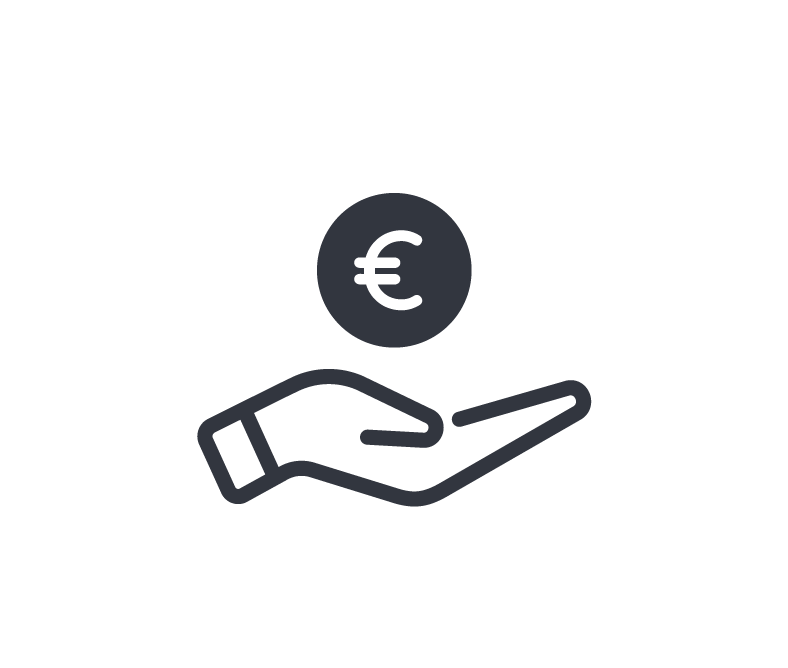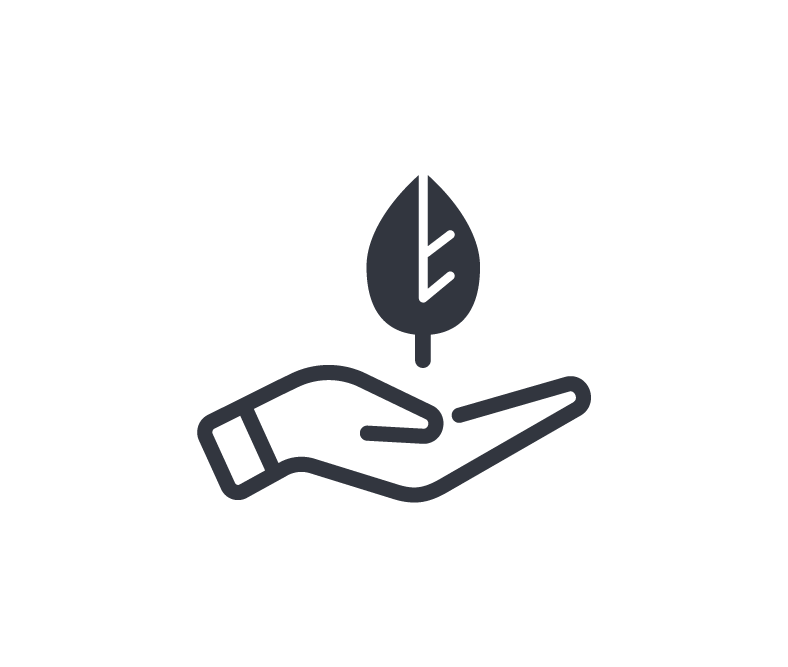Hoist Finance’s sustainability strategy is integrated into our business strategy and aims to contribute to sustainable development and create long-term value for all stakeholders.
Our material sustainability impacts are embedded into our four strategic pillars, each connected to indicators and targets to track our performance. Our corporate governance structure ensures that sustainability targets and ESG (environmental, social and governance) factors are effectively governed.
The social aspect of the ESG framework is where we have the largest impact, by contributing to a more inclusive financial ecosystem for our customers, partners and society. Our customers are central within our strategy and supporting them in customising sustainable and affordable repayment plans and always treating them with empathy and care, is essential to help them to get out of debt and get back on track financially.

Financial inclusion is a growing pan-European challenge. Hoist Finance’s social responsibility is where we have the largest material sustainability impact, in contributing to a stable and inclusive financial ecosystem for our customers, partners and society. Helping our customers by providing customised support for them to get out of debt and get back on track financially, is central to delivering on our strategy. In practice, this means always treating customers ethically and fairly and adhering to their stipulated rights and supporting customers in creating sustainable and affordable repayment plans. In addition, we provide solutions to improve our customers’ experience and financial literacy which ultimately contributes to their inclusion into the financial ecosystem.
In addition, we contribute to a well-functioning financial system by supporting banks and financial institutions to reduce risk, free up resources, meet regulatory requirements as well as deliver solutions tailored to their needs. An inclusive financial ecosystem has many advantages for society and the economy, including a positive impact on economic growth, job opportunities and household income.
To create greater shared value for financial inclusion and financial literacy, we collaborate with relevant stakeholders across our markets. We are convinced that collaboration and partnerships between players from different sectors and with different perspectives are necessary to create a more inclusive financial ecosystem. We believe that sharing aspired outcomes and measuring results is the best way to mutually create shared value.
Speaking to someone in our customer centres might feel overwhelming at first and some customers prefer using digital channels. Other customers prefer getting support directly via one of our colleagues. Therefore, offering a wide set of channels and tools to improve our customers’ experience is essential to support them in paying off their debt, while protecting their data and integrity in accordance with applicable data protection regulations.
Objectives: |
Indicators: |
|
Support customers to get out of debt and enable an inclusive financial ecosystem |
Per cent of active customers paying off on their debt with Hoist Finance |
|
Create trust in customer interactions |
Per cent of customers with high customer experience |
|
Partner bank satisfaction |
Per cent of partner banks ranking Hoist Finance among top three in the market |
Learn more about our targets on page 145-146 of our Annual and Sustainability report >>
![]()
![]()
![]()
![]()

Hoist Finance strives to be the industry’s best place to work. We are a proud culture-oriented company where our employees are at the heart of the organisation and we aim to offer the best work environment, with a culture based on equal opportunities. We deeply believe an investment in our people translates to an investment in our customers’ experience and their financial independence. Our organisational structure has clearly defined processes, roles and responsibilities focused on one thing: working effectively together as a unified company adopted to local conditions.
It is essential for the success of our business to provide our people with the right skills to treat our customers with empathy and care, remain compliant and meet their development goals. Hoist Finance Academy, our learning and development platform, provides a variety of development opportunities, including career development, skills enhancement and technical trainings.
We are committed to foster, cultivate and preserve a culture of diversity, equality and inclusion (DEI) across all our markets. Beyond the direct value for our employees, we see clear business value in working actively with DEI to retain and attract talent and improve performance.
Our industry is dominated by a young and flexible workforce and a fast-paced environment, and we are just like many others affected by the increased movement in the labour market. To retain and attract talent, Hoist Finance seeks to offer best in class labour conditions in terms of benefits and a strong focus on internal promotion opportunities. To mitigate the consequences of increased pressure on salary increases in 2022 following rising inflation levels, Hoist Finance has revised the cycle for salary reviews and prioritised salary increases for employees mostly affected by increasing inflation.
Many of our employees are in daily contact with customers in difficult situations which can be stressful, and the health and wellbeing of our employees is highly prioritised across the group. To prevent workplace-related stress and other mental health issues, a set of tools and solutions have been provided to employees during 2022, such as stress management and health leadership trainings and various local initiatives covering meetings with counsellors and psychologist, health checks, and sports and culture activities. Furthermore, our hybrid working model enables our employees to have more flexibility in how they manage their work-life balance.
Objectives: |
Indicators: |
|
Employee wellbeing & satisfaction |
eNPS |
|
Health and wellbeing score in Hoist Finance's employee survey |
|
|
Diversity improvements in recruitment processes |
Per cent of managers completing unconscious bias training |
|
Equality in management |
Per cent of female representation in management |
Learn more about our targets on page 145-146 of our Annual and Sustainability report >>
![]()
![]()

Our corporate governance structure is fundamental for ensuring the efficient and effective governance and control of our business, a well-balanced assignment of responsibilities and that we have a systematic approach for upholding business ethics. We have implemented a robust and centrally coordinated compliance-monitoring programme, which evaluates and assesses compliance with legal, regulatory and industry best practices, as well as our own stringent internal standards. Our sustainability governance is integrated within the corporate governance structure, and our Business Ethics and Sustainability Committee ensures sustainability and ESG issues are escalated to the management and board level. Read more on our Sustainability governance page.
Hoist Finance is a member of the United Nations Global Compact and is committed to its Ten Principles for human rights, labour, the environment and anti-corruption since 2019. Also, our strategic pillars and objectives are aligned with our contribution to Agenda 2030 and the UN Sustainable Development Goals (SDGs).
Data protection is paramount for protecting the right to privacy of our customers’ personal data. This is especially critical in our industry, where many customers are in difficult and sensitive situations. We are fully committed to process personal data fairly and in accordance with applicable data protection laws and regulations. To fulfil these obligations, we have implemented a comprehensive privacy programme, including the implementation of necessary policies and instructions, regular trainings, and the appointment of Data Protection Officers in all jurisdictions.
Managing cybersecurity is crucial to Hoist Finance, as we store and process large amounts of sensitive data. Successful attacks on the systems holding this data would have negative consequences for us, our customers and our partners. Information security is handled in all three layers of defence at Hoist Finance. Also, security awareness among employees is tested through trainings on a regular basis.
Corruption and money laundering are causing grand challenges for society, and Hoist Finance is strongly committed to reducing risks throughout our value chain. We are determined to prevent, monitor, manage and enforce measures related to corruption and conflicts of interest and regularly carry out risk analyses related to corruption risk. Furthermore, we are continuously strengthening the company’s defence against money laundering and terrorist financing by improving key processes. During 2022, preventative measures include continuous customer due diligence and transaction monitoring.
Hoist Finance empowers all employees to anonymously report misconduct, unethical or illegal behaviours through a whistleblowing mechanism provided by an independent external supplier. All concerns are treated with strict confidentiality, ensuring that no one will be penalised or victimised in any way. Access to whistleblowing messages is restricted to appointed individuals and reports are managed on a case-by-case basis. When an investigation needs to be initiated, necessary actions are taken internally or reported to external authorities if needed.
Objectives: |
Indicators: |
|
Strong customer integrity processes |
Per cent of employees completingtraining on data protection |
|
Robust framework on AML and anti-corruption practices |
HOFI anti-corruption Index |
|
Per cent of employees completing training on conflicts of interest and anti-corruption |
|
|
Per cent of employees completing training on anti-money laundering |
|
|
Strong cybersecurity processes |
Per cent of employees completing training on security awareness |
|
Strong sustainability awareness |
Per cent of employees completing training on sustainability and ESG |
Learn more about our targets on page 145-146 of our Annual and Sustainability report >>
![]()
![]()
![]()
![]()
![]()

As a leading European asset manager of non-performing loans focused on ethical business conduct, we have an important responsibility in reducing our environmental impact and climate footprint. While our materiality assessment demonstrates that our largest impact is related to social responsibility, we are strongly committed to contributing to Agenda 2030, the goals of the Paris Agreement and the 1.5 °C target.
Hoist Finance has accounted for our climate footprint according to the Greenhouse Gas (GHG) Protocol, covering Scope 1, 2 and 3 since 2017. Hoist Finance’s emissions are mainly originating from energy use in offices, business travel and company cars. We are continuously improving the assessment of our Scope 3 emissions inclusions to understand the full scope of our impact.
Identifying, assessing, and mitigating ESG factors driving risks is increasingly important to Hoist Finance. We recognise that ESG factors are drivers for financial risks, and that it is crucial to integrate those across our risk management processes. To learn more, see our disclosures according to the Task Force on Climate-Related Financial Disclosures (TCFD) in our Annual and Sustainability report.
Objectives: |
Indicators: |
|
Reduce direct and indirect CO2 emissions |
Total CO2 emissions |
Learn more about our targets on page 145-146 of our Annual and Sustainability report >>
![]()